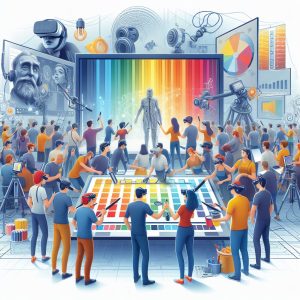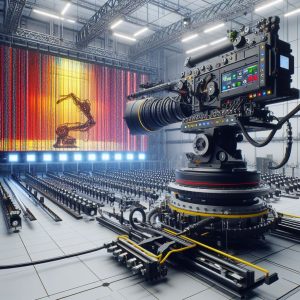Introduction
The film industry is on the cusp of a new era, driven by the rapid advancements in artificial intelligence (AI) technology. AI is transforming every aspect of filmmaking, from pre-production to post-production, and is poised to revolutionize the way movies are produced. In this blog post, we will explore the transformative role of AI in filmmaking and delve into the future of movie production.
AI in Pre-Production
AI has significantly impacted the pre-production phase of filmmaking. It is used to analyze scripts, identify potential plot holes, and suggest improvements to the story. AI-powered software can also generate realistic 3D models of sets and characters, allowing filmmakers to visualize the film before shooting begins. This technology saves time and resources, enabling filmmakers to make informed decisions about the production design.
AI in Production
AI is also revolutionizing the production phase of filmmaking. AI-powered cameras can automatically adjust settings based on lighting conditions, ensuring optimal image quality. AI-powered drones can capture stunning aerial shots, providing filmmakers with new and exciting perspectives. Additionally, AI is being used to create virtual actors, which can be used for dangerous or complex scenes. This technology not only reduces risk but also expands the creative possibilities for filmmakers.
AI in Post-Production
AI is making a significant impact on post-production. AI-powered software can automatically color correct and edit footage, saving editors time and effort. AI can also be used to create realistic visual effects, such as explosions, fires, and weather conditions. This technology allows filmmakers to achieve stunning visuals without the need for expensive on-set effects.
The Future of AI in Filmmaking
AI is poised to play an even greater role in filmmaking in the future. As AI technology continues to advance, we can expect to see even more innovative and transformative applications in the film industry. AI-powered software will be able to generate entire scripts, create photorealistic virtual actors, and even direct films. This technology will empower filmmakers to create more engaging and immersive experiences for audiences.
Conclusion
AI is transforming filmmaking in profound ways, from pre-production to post-production. It is enabling filmmakers to create stunning visuals, save time and resources, and explore new creative possibilities. As AI technology continues to advance, we can expect to see even more transformative applications in the film industry, revolutionizing the way movies are produced and consumed.
The Changing Landscape of the Producer Job in the Cinema Industry: Dangers, Possibilities, and Adaptation

The film and television industry is undergoing a digital transformation, and artificial intelligence (AI) is at the forefront of this change. AI-powered tools and technologies are already being used to automate tasks and improve efficiency in various aspects of filmmaking, and their impact on the producer’s job is expected to grow in the coming years.
Dangers of AI Replacing Producers
1. Automation of Tasks:
AI-driven software can automate repetitive tasks such as editing, color grading, and visual effects, reducing the need for human input. This could lead to a decrease in job opportunities for producers who specialize in these areas.
2. Data-Driven Decision-Making:
AI algorithms can analyze audience data, box office trends, and social media engagement to provide insights into viewer preferences and potential film success. This could potentially influence decision-making processes and reduce the reliance on producers’ subjective judgments.
3. Content Generation:
AI-powered tools can generate realistic scripts, visual effects, and even entire films. While the technology is still in its early stages, it raises concerns about the future of human creativity in the film industry.
Possibilities for AI to Assist Producers
1. Enhanced Pre-Production:
AI can help producers analyze scripts for potential weaknesses, identify suitable locations, and optimize casting choices. This can lead to more efficient and effective pre-production processes.
2. Improved Editing and Post-Production:
AI-driven tools can assist with editing tasks such as scene selection, color correction, and sound mixing. Additionally, AI can be used to create realistic visual effects and animations, reducing reliance on expensive and time-consuming manual labor.
3. Data-Driven Marketing and Distribution:
AI algorithms can analyze audience data to identify target demographics, optimize marketing campaigns, and select the most effective distribution channels for a film. This can lead to increased box office revenue and a wider audience reach.
How Producers Can Adapt to the Changing Landscape
1. Embrace Technology:
Producers should familiarize themselves with AI-powered tools and technologies to better understand their capabilities and limitations. This will enable them to leverage AI to improve their workflow and increase efficiency.
2. Develop New Skills:
Producers need to expand their skill set to include data analysis, storytelling, and project management. These skills will become increasingly important as AI takes over more routine tasks, allowing producers to focus on higher-level decision-making and creative problem-solving.
3. Collaborate with AI:
Instead of viewing AI as a threat, producers should approach it as a powerful tool that can enhance their capabilities. By working collaboratively with AI, producers can unlock new possibilities and create more innovative and compelling content.
4. Adapt to Changing Business Models:
AI-driven technologies may lead to new business models and revenue streams in the film industry. Producers who are willing to adapt and pivot their strategies accordingly will be better positioned to succeed in the changing landscape.
5. Advocate for Human Creativity:
Producers should champion human creativity and the importance of storytelling in the film industry. By emphasizing the unique contributions that human filmmakers bring to the process, they can help ensure that AI remains a tool rather than a replacement for human talent.
In conclusion, the rise of AI in the cinema industry presents both challenges and opportunities for producers. By embracing technology, developing new skills, and adapting to the changing landscape, producers can position themselves for success in the digital age and continue to play a vital role in creating compelling and entertaining content for audiences around the world.



